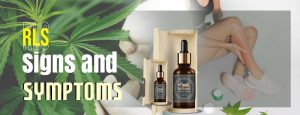
What is Restless Leg Syndrome and How Can It Be Cured?
Do you feel an uncontrollable urge to move your leg? To an extent where you can’t keep your leg still? If so, then you may be suffering from a condition called Restless Leg Syndrome, or RLS. It may be comforting to know that you are not alone. At some point, around five out of every 100 people will experience restless leg syndrome. The awareness around Restless Leg Syndrome, or RLS, is still in its nascent stage in India, and those who suffer from it are looking for ways to manage this condition. In this blog, we will try to understand what RLS is, what causes it, and how it can be treated. Since many people are known to benefit from CBD oil, we’ll also discuss whether you can use cannabidiol oil (CBD oil in India) to overcome RLS and its symptoms.
Table of Contents
What is Restless Leg Syndrome?
Restless legs syndrome (RLS) is a relatively uncommon nervous system disorder that is often characterised by a strong need to move one's legs. Other names for the condition include Ekbom syndrome, RLS, and Willis-Ekbom illnesses, among others. It is frequently worse in the evening and might make sleeping difficult. The unusual sensation in the calves has been described as a form of cramp, stiffness, or a creeping, crawling sensation, and those who are affected by it have reported that moving their legs repeatedly brings relief.
Other illnesses, such as diabetes, iron deficiency anaemia, alcoholism, and some types of arthritis, can also induce these symptoms. RLS is frequently linked to various underlying disorders because of this.RLS usually affects both legs, but it is very rare to merely have uncomfortable sensations in one leg. Mild, moderate, or severe symptoms can be seen in patients, and can even cause insomnia and poor sleep in severe circumstances.

What causes Restless Leg Syndrome?
It is not known exactly what causes restless leg syndrome. Although there is a possibility of a hereditary predisposition in some people, it is also known to be caused by a variety of environmental factors. In terms of genetic predisposition, about a quarter of patients with RLS have a family history of the disorder. In reality, RLS has been linked to five different gene variations. Symptoms usually appear before the age of 40 when it runs in the family. Some deficiencies have been linked to the development of RLS. Even when blood work reveals that your iron level is normal, studies suggest that RLS has more to do with the low levels of iron in the brain.
RLS is thought to be caused by an instability in the brain's dopamine pathways, and disorders that influence dopamine are also known to cause it. Parkinson's disease is one example of this, as people with Parkinson's also have an uncontrollable need to move their legs. Certain chemicals, such as caffeine or alcohol, may provoke or exacerbate symptoms. Other possible causes include allergy medicine, nausea, sadness, and psychosis. RLS without an underlying cause is known as primary RLS. RLS, on the other hand, can be a symptom of another ailment, such as neuropathy, diabetes, or renal failure. If this is the case, treating the underlying disease may be enough to alleviate RLS symptoms.
How to identify RLS?
Restless leg syndrome can't be confirmed or ruled out with a test. Your symptoms will be taken into consideration to arrive at an accurate diagnosis.
The following are some of the most prevalent RLS symptoms:
- A strong desire to move one or both legs.
- Itching, tingling, burning, and other strange sensations
- Symptoms get worse at night (symptoms are usually mild or absent during the daytime).
- When you try to relax or sleep, your symptoms get worse.
- A feeling of relief once you start moving
Even if all of the criteria are met, a physical examination will almost certainly be required to detect or rule out any neurological causes for your symptoms. Tell your doctor about any other health issues you're dealing with, as well as any medications or supplements you're taking. Your doctor may prescribe blood tests to identify abnormalities or deficiencies. They may then refer you to a sleep expert, neurologist, or other specialists if there are any signs that something other than RLS is causing your symptoms.
Overcoming Restless Leg Syndrome
RLS symptoms can be considerably relieved by treating an underlying problem, such as iron insufficiency. Iron supplements can be taken orally or intravenously to treat an iron deficiency. If you happen to be anaemic, your doctor may prescribe iron supplements and that should resolve the issue. Usually, RLS resolves itself once the underlying cause is detected and treated. RLS that is not triggered by an underlying cause may require a lifestyle change. If things still don't work, your doctor may prescribe drugs to alleviate the symptoms. While your doctor may put you on medication to overcome RLS, this is usually only a short-term fix. For a long-term solution, the underlying cause needs to be identified and fixed, and appropriate lifestyle changes need to be made to alleviate and eradicate the symptoms.

Can CBD oil help with restless leg syndrome?
Cannabidiol (CBD) and tetrahydrocannabinol (THC), the psychoactive ingredient, are both found in the cannabis plant. CBD and THC both interact with the endocannabinoid system in the body, which controls how we perceive certain physiological feelings. Mood, hunger, energy level, pain, and sleep are just a few of these feelings. CBD (cannabidiol oil in India), has been discovered to cure a range of illnesses in recent years, including chronic pain and inflammation. CBD oil's main advantage for RLS patients is its soothing effect, which helps them fall asleep more easily. Several studies have found that patients with RLS experience a reduction in symptoms after using cannabis.
While CBD oil is not a treatment for RLS, it does help to ease some of the condition's unpleasant symptoms. If you have been experiencing the symptoms of restless leg syndrome, your doctor will evaluate you and go through your medical history to reach a diagnosis. Since other health conditions and diseases such as anaemia, kidney disorders, diabetes, and Parkinson’s disease have also been linked to RLS, these will have to be identified and treated for your RLS symptoms to get better. It could also be a side effect of your medications, such as antidepressants and other drugs. If you have one of these problems, you may be administered dopamine medications, iron supplements, or another drug to address it.
Conclusion
While RLS may come across as a benign condition, it may take a toll on a person’s life. While medications and supplements like cannabidiol oil in India have been proven to be of help, they are not a viable option for the long term. This is where lifestyle modifications come into play. RLS symptoms might be alleviated by making little changes to your lifestyle. The majority of lifestyle improvements entail becoming more active and eliminating undesirable behaviours. While this may appear difficult at first, with a little practice, it will become second nature. Caffeine consumption should be reduced to alleviate the symptoms. On the other hand, supplements like CBD oil in India have been known to reduce RLS. Similarly, smoking and consuming alcohol should be avoided. Anxiety and restlessness are two more factors that have been linked to RLS. If you have anxiety, it is most likely one of the causes. RLS symptoms can be alleviated with meditation, frequent physical activity, and other approaches.
